Career statistics
International goals
Scores and results list Iraq's goal tally first.
| No | Date | Venue | Opponent | Score | Result | Competition |
|---|---|---|---|---|---|---|
| 1. | 21 March 1973 | Sydney Sports Ground, Sydney | 2–1 | 3–2 | 1974 FIFA World Cup qualification |
| Personal information | |||
|---|---|---|---|
| Full name | Salah Obeid | ||
| Place of birth | Iraq | ||
| Position(s) | Forward | ||
| Senior career* | |||
| Years | Team | Apps | (Gls) |
| Al-Quwa Al-Jawiya | |||
| International career | |||
| 1971–1974 | Iraq | ||
| *Club domestic league appearances and goals | |||
Salah Obeid is a former Iraqi football forward who played for Iraq in the 1974 FIFA World Cup qualification. [1]
Scores and results list Iraq's goal tally first.
| No | Date | Venue | Opponent | Score | Result | Competition |
|---|---|---|---|---|---|---|
| 1. | 21 March 1973 | Sydney Sports Ground, Sydney | 2–1 | 3–2 | 1974 FIFA World Cup qualification |

Baghdad is the capital of Iraq and the second-largest city in the Arab world after Cairo. It is located on the Tigris near the ruins of the ancient city of Babylon. In 762 CE, Baghdad was chosen as the capital of the Abbasid Caliphate, and became its most notable major development project. Within a short time, the city evolved into a significant cultural, commercial, and intellectual center of the Muslim world. This, in addition to housing several key academic institutions, including the House of Wisdom, as well as a multiethnic and multi-religious environment, garnered it a worldwide reputation as the "Center of Learning".

The Iran–Iraq War was an armed conflict between Iran and Iraq that lasted from September 1980 to August 1988. It began with the Iraqi invasion of Iran and lasted for almost eight years, until the acceptance of United Nations Security Council Resolution 598 by both sides. Iraq's primary rationale for the attack against Iran cited the need to prevent Ruhollah Khomeini—who had spearheaded Iran's Islamic Revolution in 1979—from exporting the new Iranian ideology to Iraq; there were also fears among the Iraqi leadership of Saddam Hussein that Iran, a theocratic state with a population predominantly composed of Shia Muslims, would exploit sectarian tensions in Iraq by rallying Iraq's Shia majority against the Baʽathist government, which was officially secular and dominated by Sunni Muslims. Iraq also wished to replace Iran as the power player in the Persian Gulf, which was not seen as an achievable objective prior to the Islamic Revolution because of Pahlavi Iran's economic and military superiority as well as its close relationships with the United States and Israel.

Saddam Hussein was an Iraqi politician and revolutionary who was the fifth president of Iraq, from 16 July 1979 until 9 April 2003. He also served as prime minister of Iraq, first from 16 July 1979 until 23 March 1991, and later from 29 May 1994 to 9 April 2003. He was a leading member of the revolutionary Arab Socialist Ba'ath Party, and later, the Baghdad-based Ba'ath Party and its regional organization, the Iraqi Ba'ath Party, which espoused Ba'athism, a mix of Arab nationalism and Arab socialism.

Basra is a city in southern Iraq located on the Shatt al-Arab in the Arabian Peninsula. It had an estimated population of 1.4 million in 2018. Basra is also Iraq's main port, although it does not have deep water access, which is handled at the port of Umm Qasr. However, there is ongoing construction of Grand Faw Port on the coast of Basra, which is considered a national project for Iraq and will become one of the largest ports in the world and the largest in the Middle East, in addition, the port will strengthen Iraq’s geopolitical position in the region and the world. Furthermore, Iraq is planning to establish a large naval base in the Faw peninsula.

Kurdistan, or Greater Kurdistan, is a roughly defined geo-cultural territory in Western Asia wherein the Kurds form a prominent majority population and the Kurdish culture, languages, and national identity have historically been based. Geographically, Kurdistan roughly encompasses the northwestern Zagros and the eastern Taurus mountain ranges.

The Gulf War was a 1990–1991 armed campaign waged by a 39-country military coalition in response to the Iraqi invasion of Kuwait. Spearheaded by the United States, the coalition's efforts against Iraq were carried out in two key phases: Operation Desert Shield, which marked the military buildup from August 1990 to January 1991; and Operation Desert Storm, which began with the aerial bombing campaign against Iraq on 17 January 1991 and came to a close with the American-led Liberation of Kuwait on 28 February 1991.

The 2003 invasion of Iraq was a United States-led invasion of the Republic of Iraq and the first stage of the Iraq War. The invasion phase began on 19 March 2003 (air) and 20 March 2003 (ground) and lasted just over one month, including 26 days of major combat operations, in which a combined force of troops from the United States, the United Kingdom, Australia and Poland invaded Iraq. Twenty-two days after the first day of the invasion, the capital city of Baghdad was captured by Coalition forces on 9 April 2003 after the six-day-long Battle of Baghdad. This early stage of the war formally ended on 1 May 2003 when U.S. President George W. Bush declared the "end of major combat operations" in his Mission Accomplished speech, after which the Coalition Provisional Authority (CPA) was established as the first of several successive transitional governments leading up to the first Iraqi parliamentary election in January 2005. U.S. military forces later remained in Iraq until the withdrawal in 2011.
Academi, formerly known as Blackwater, is an American private military contractor founded on December 26, 1996, by former Navy SEAL officer Erik Prince. It was renamed Xe Services in 2009, and was again renamed to 'Academi' in 2011, after it was acquired by a group of private investors. In 2014, Academi merged with Triple Canopy to form Constellis Holdings.

During the early stages of the Iraq War, members of the United States Army and the Central Intelligence Agency committed a series of human rights violations and war crimes against detainees in the Abu Ghraib prison in Iraq, including physical abuse, sexual humiliation, both physical and psychological torture, rape, as well the killing of Manadel al-Jamadi and the desecration of his body. The abuses came to public attention with the publication of photographs of the abuse by CBS News in April 2004. The incidents caused shock and outrage, receiving widespread condemnation within the United States and internationally.

Iraqi Kurdistan or Southern Kurdistan refers to the Kurdish-populated part of northern Iraq. It is considered one of the four parts of "Kurdistan" in Western Asia, which also includes parts of southeastern Turkey, northern Syria, and northwestern Iran. Much of the geographical and cultural region of Iraqi Kurdistan is part of the Kurdistan Region (KRI), an autonomous region recognized by the Constitution of Iraq. As with the rest of Kurdistan, and unlike most of the rest of Iraq, the region is inland and mountainous.
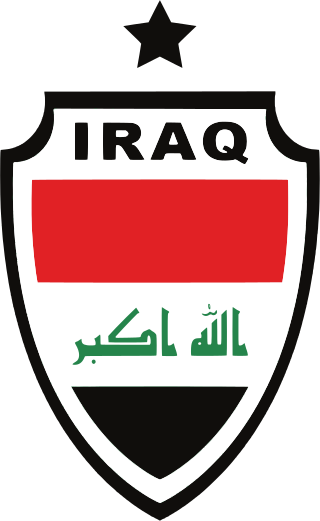
The Iraq national football team represents Iraq in international football and is controlled by the Iraq Football Association (IFA), the governing body for football in Iraq. Iraq's usual home venue is the Basra International Stadium.

The Iraqi invasion of Kuwait was an operation conducted by Iraq on 2 August 1990, whereby it invaded the neighboring State of Kuwait, consequently resulting in a seven-month-long Iraqi military occupation of the country. The invasion and Iraq's subsequent refusal to withdraw from Kuwait by a deadline mandated by the United Nations led to a direct military intervention by a United Nations-authorized coalition of forces led by the United States. These events came to be known as the first Gulf War, eventually resulting in the forced expulsion of Iraqi troops from Kuwait and the Iraqis setting 600 Kuwaiti oil wells on fire during their retreat, as a scorched earth strategy.

Kurdistan Region, abbr. KRI, is an autonomous region in Iraq comprising the four Kurdish-majority governorates of Erbil, Sulaymaniyah, Duhok, and Halabja, and bordering Iran, Syria, and Turkey. The Kurdistan Region encompasses most of Iraqi Kurdistan but excludes the disputed territories of Northern Iraq, contested between the Kurdistan Regional Government and the central Iraqi government in Baghdad since 1992 when autonomy was realized. The Kurdistan Region Parliament is situated in Erbil, but the constitution of the Kurdistan Region declares the disputed city of Kirkuk to be the capital of the Kurdistan Region. When the Iraqi Army withdrew from most of the disputed areas in mid-2014 following the Islamic State’s invasion of Iraq, Kurdish Forces entered the areas and held control there until Iraq retook the areas in October 2017.
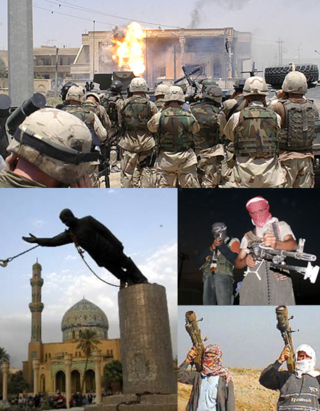
The Iraq War was a protracted armed conflict in Iraq from 2003 to 2011 that began with the invasion of Iraq by the United States-led coalition that overthrew the Iraqi government of Saddam Hussein. The conflict continued for much of the next decade as an insurgency emerged to oppose the coalition forces and the post-invasion Iraqi government. US troops were officially withdrawn in 2011. The United States became re-involved in 2014 at the head of a new coalition, and the insurgency and many dimensions of the armed conflict are ongoing. The invasion occurred as part of the George W. Bush administration's war on terror following the September 11 attacks, despite no connection between Iraq and the attacks.

Iraq, officially the Republic of Iraq, is a country in Western Asia. It is bordered by Turkey to the north, Iran to the east, the Persian Gulf and Kuwait to the southeast, Saudi Arabia to the south, Jordan to the southwest and Syria to the west. The capital and largest city is Baghdad. The Iraqi people are diverse; mostly Arabs, as well as Kurds, Turkmen, Assyrians, Armenians, Yazidis, Mandaeans, Persians and Shabakis with similarly diverse geography and wildlife. Most Iraqis are Muslims – minority faiths include Christianity, Yazidism, Mandaeism, Yarsanism and Zoroastrianism. The official languages of Iraq are Arabic and Kurdish; others also recognised in specific regions are Turkish (Turkmen), Suret (Assyrian), and Armenian.

Abu Musab al-Zarqawi, born Ahmad Fadeel al-Nazal al-Khalayleh, was a Jordanian jihadist who ran a terrorist training camp in Afghanistan. He became known after going to Iraq and being responsible for a series of bombings, beheadings, and attacks during the Iraq War, reportedly "turning an insurgency against US troops" in Iraq "into a Shia–Sunni civil war". He was sometimes known by his supporters as the "Sheikh of the slaughterers".

The Islamic State (IS), also known as the Islamic State of Iraq and the Levant, Islamic State of Iraq and Syria, and by its Arabic acronym Da'ish or Daesh, is a militant Islamist group and former unrecognized quasi-state that follows the Salafi jihadist branch of Sunni Islam. It was founded by Abu Musab al-Zarqawi in 1999 and gained global prominence in 2014, when it drove Iraqi security forces out of key cities during the Anbar campaign, which was followed by its capture of Mosul and the Sinjar massacre. The organization significantly revamped the course of the Syrian civil war when it announced its expansion into Syria in mid-2013 and began conducting ground attacks against both Syrian government forces and Syrian opposition militias. By the end of 2015, it held an area that contained an estimated eight to twelve million people and stretched from western Iraq to eastern Syria, where it enforced its interpretation of Islamic law. ISIL was estimated at the time to have an annual budget of more than US$1 billion and more than 30,000 fighters.
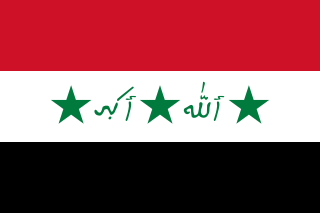
Ba'athist Iraq, formally the Iraqi Republic until 6 January 1992 and the Republic of Iraq thereafter, covers the national history of Iraq between 1968 and 2003 under the rule of the Arab Socialist Ba'ath Party. This period began with high economic growth and soaring prosperity, but ended with Iraq facing social, political, and economic stagnation. The average annual income decreased both because of external factors such as the heavy sanctions placed on Iraq by Western countries and the internal policies of the Iraqi government.
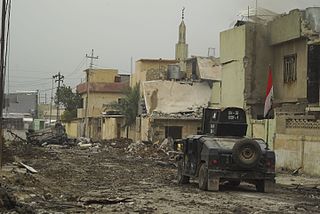
The War in Iraq was an armed conflict between Iraq and its allies and the Islamic State which began in 2013 and ended in December 2017. Following December 2013, the insurgency escalated into full-scale guerrilla warfare following clashes in the cities of Ramadi and Fallujah in parts of western Iraq, and culminated in the Islamic State offensive into Iraq in June 2014, which lead to the capture of the cities of Mosul, Tikrit and other cities in western and northern Iraq by the Islamic State. Between 4–9 June 2014, the city of Mosul was attacked and later fell; following this, Prime Minister Nuri al-Maliki called for a national state of emergency on 10 June. However, despite the security crisis, Iraq's parliament did not allow Maliki to declare a state of emergency; many legislators boycotted the session because they opposed expanding the prime minister's powers. Ali Ghaidan, a former military commander in Mosul, accused al-Maliki of being the one who issued the order to withdraw from the city of Mosul. At its height, ISIL held 56,000 square kilometers of Iraqi territory, containing 4.5 million citizens.
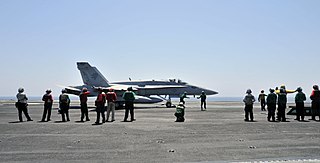
On 15 June 2014, U.S. President Barack Obama ordered United States forces to be dispatched in response to the Northern Iraq offensive of the Islamic State (IS) as part of Operation Inherent Resolve. At the invitation of the Iraqi government, American troops went to assess Iraqi forces and the threat posed by ISIL.